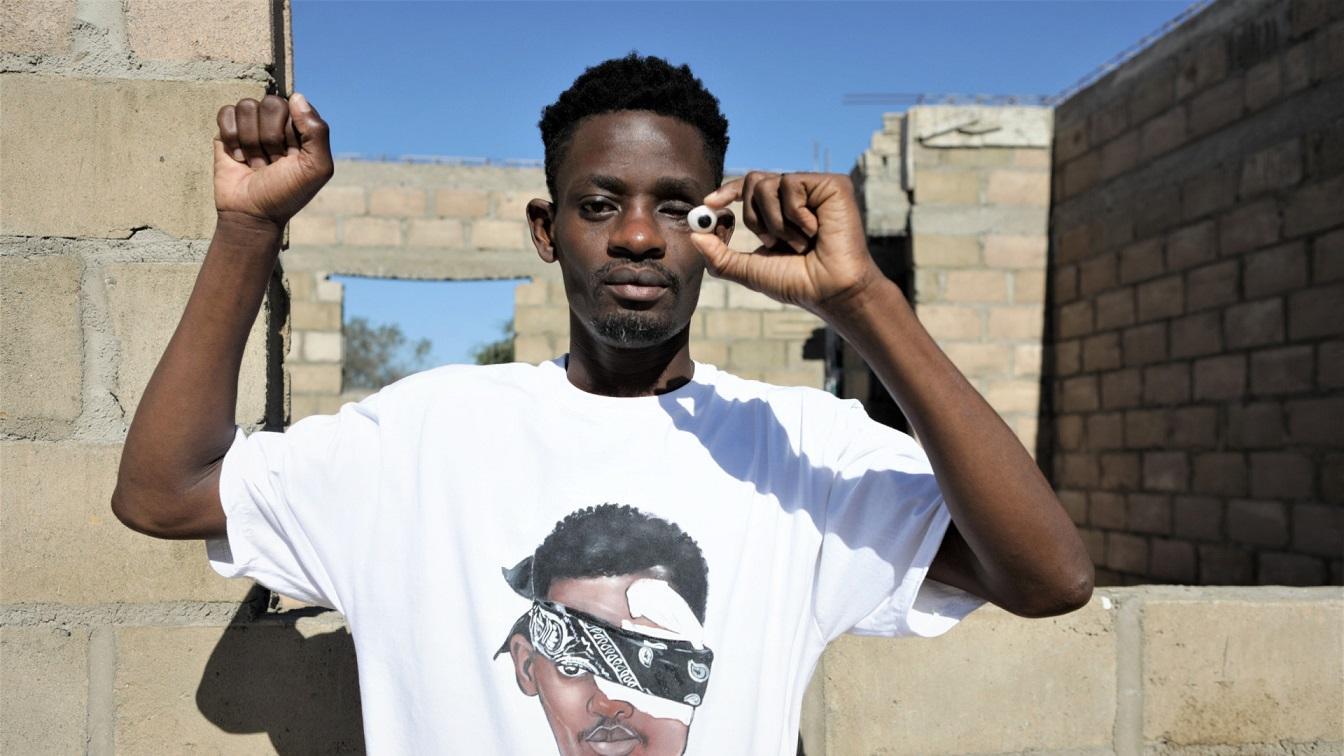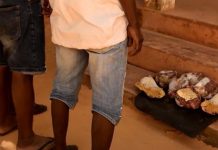Africa-Press – Mozambique. Inocêncio Manhique, 34, lost his left eye when he was hit by a rubber bullet during police repression of the march in honour of Mozambican rapper Azagaia in Maputo three months ago on Sunday.
His case stood out among the protesting voices captured in street interviews broadcast on television during one of the most turbulent days in recent years in the Mozambican capital.
Since then, Inocêncio Manhique’s life has been turned upside down and is spent between the hospital, anonymous threats, deprivation and posts on social networks about the “revolution”, but without any help from the state, he regrets – so much so that he calls it a “failed state”.
“I had to undergo a [new] surgery, and I have very bad headaches on the left side which greatly upset me,” he tells Lusa at his house in the Katembe neighbourhood on the south bank of Maputo bay.
Ivete, the wife, hands him an ocular prosthesis that he places in the eye socket.
‘It’s as if the mind shuts down’
When it gets dark and he has to remove the prosthesis, “it’s as if the mind shuts down” and “the brain has to adapt to a dark place”.
It’s very difficult to see with just one eye, he says, wearing a white ‘t-shirt’ sporting a caricature of him with a handkerchief covering his left eye.
He regrets not being able to read the last book given to him: “Uria Simango: Um Homem, Uma Causa”, a biography of the dissident Mozambique Liberation Front (Frelimo) leader, victim of the purges that shook the independence movement at the time run by the party now in government.
He also regrets not being able to read “Niketche, a Story of Polygamy”, the next book he wanted to buy, by Mozambican novelist Paulina Chiziane, Camões Prize 2021 winner, because he can’t read more than two pages, such is the effort he has to make with his remaining eye.
He regrets not being able to see his “rapper” of choice, the Portuguese Valete, who will be in Maputo for an Azagaia tribute show, because the concert will be at night and Inocêncio Manhique no longer has a “night life”.
Manhique says that he received help from many people and private institutions, but none from the state, although he has instructed a lawyer to claim compensation for the injuries and damage caused.
Now he lacks money due to pay the costs of hospital treatment, which his occupation , as an informal seller of second-hand clothes, cannot supply.
Inocêncio Manhique further claims that he has become the target of threats, having been told several times by unknown parties to stop criticizing the government.
“Stop filming live posts, or we’ll take your other eye,” one of the anonymous authors of the threats said.
But Manhique says that he lost the sight in his left eye at the hands of the authorities, which only intensified his civic militancy and commitment to “the revolution” until there is a “change in the country”.
“This forged a different man,” he stresses. “It is clear that the regime of the day is not about to accept different thinking,” so it is necessary to continue to protest.
His wife says that she is scared.
“I’m not as brave as he is, but I support what he does, even if sometimes I don’t agree with some things,” says Ivete, thinking of her husband and the couple’s three children: two girls and a boy.
Manhique was one of several victims of police violence on March 18.
José Joanisse, 56 years old and a ‘madjermane’ – a former worker in the German Democratic Republic (GDR) – says he has been suffering from severe headaches since his forehead was torn open by a tear gas canister, a wound for which he received seven stitches.
Living ‘like an ant or a little bird’
“I want compensation, but so far no one has helped me with money to get a lawyer. The little I had was spent on medication,” he tells Lusa.
A house painter by profession, Joanisse says that he stopped working because of the pain and lives like “an ant or a little bird”, which “picks up crumbs so as not to starve”.
He insists he is compromised by the government’s lack of attention to victims of police violence.
Joanisse knows what he is talking about: he has participated every Wednesday for more than 33 years in the march of former Mozambican workers in the GDR who claim historic entitlements, and never before has such violence arisen.
When he was hit three months ago, “he wasn’t even participating in the march for Azagaia” – he was just in the wrong place at the wrong time, standing on a sidewalk outside the Alto Maé garden, he says.
The 18th of March was a day of chaos in the centre of Maputo.
Mozambican police officers claimed to have had “superior orders”, never clarified, to disperse groups who were however authorised to stage a peaceful march in tribute to the social interventionist ‘rapper’ Azagaia, who had died of illness nine days earlier.
Azagaia was known for his lyrics concerning political opposition, and his funeral, which brought Maputo to the streets, had already provoked high feelings among the security forces and the population.
In her annual report on the state of justice in the country, the Attorney General of the Republic, Beatriz Buchili, said that the Public Prosecutor’s Office had opened criminal proceedings against agents involved in the March 18 skirmishes, but since then no further developments have been made known.
The Mozambican police frequently prevent peaceful protests, despite voices – such as that of the Attorney General herself – who recall that the Constitution guarantees the right to demonstrate, and does not require authorization.
Lusa contacted the Presidency of the Republic, the Attorney General’s Office and the General Command of the Police of the Republic of Mozambique, but has so far obtained no further clarification on the victims’ situation.
For More News And Analysis About Mozambique Follow Africa-Press






